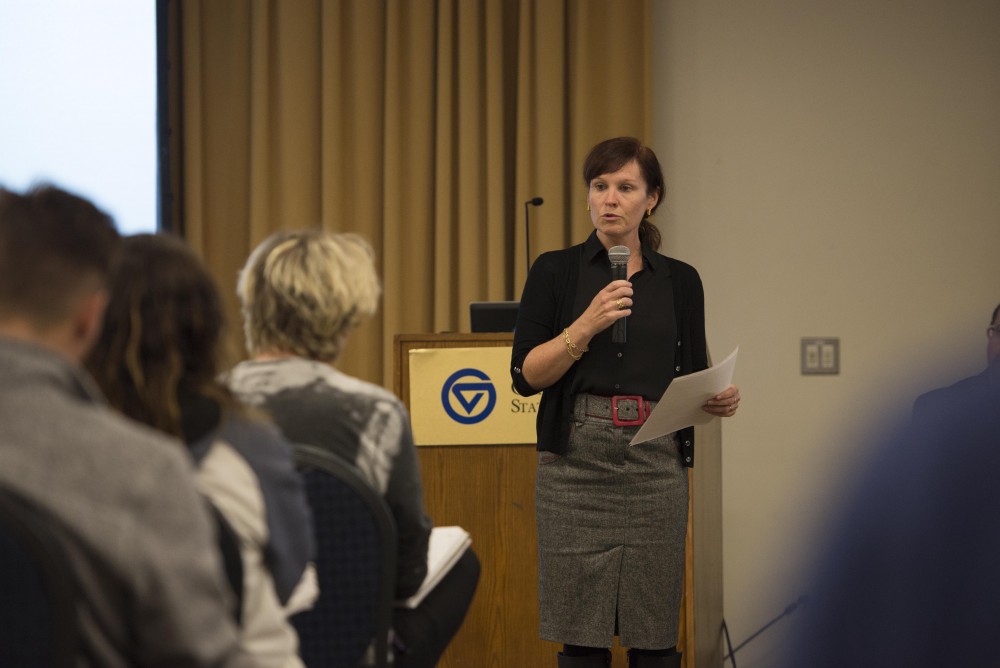Islamophobia panel combats stereotypes at GVSU

GVL / Luke Holmes – Coeli Fitzpatrick speaks in front of students and faculty. The “Islamophobia” lecture was held in the Kirkhof Center on Thursday, Oct. 27, 2016.
Oct 31, 2016
The concept for an event on Islamophobia came from GVSU’s community read, ‘The True American,’ a book that takes place after Sept. 11 and involves the shooting of a man purely due to the fact that he appears to be Muslim. The organizers of the event decided to set up an informational Q&A style panel of three professors to help address some of this underlying racism.
Coeli Fitzpatrick, professor in the Frederik Meijer Honors College and coordinator of the program, believes a large amount of this ‘Islamophobia’ is due to stereotypes.
“There’s only one version of Islam that makes it in the news and that’s violence,” she said.
The imagery of Islam that is most often portrayed is due to lack of education on the subject and is fueled by fear. Fitzpatrick mentioned the creation of anti-Muslim memes on social media or the false reporting of President Barack Obama as a Muslim in the hopes of classifying him an unqualified candidate due to this fact.
“Islamophobia isn’t so much about what Islam is or is not, but how Americans see Islam,” Fitzpatrick said.
The other two speakers at the event, Jim Goode and Chad Lingwood, both professors in the history department, addressed some of the same stereotypes from two different perspectives.
Lingwood spoke about the historical aspects of Islamophobia, tracing all the way back to the seventh and eighth centuries. Some of the biggest issues faced by Muslims in the past involved the public viewing them as heretics.
“Only by defeating Muslims would the entire world unite,” Lingwood said.
Hearing these details from history allowed listeners to begin to grasp Islamophobia from the past and see why it is still prevalent today.
“I thought the history was the most interesting because it shows how it’s engrained,” Alex Misiak, a student at the event said. “It was certainly thought-provoking.”
Goode wanted to address the most current problems associated with Islamophobia, focusing his talk on ISIS and Al Qaeda and how the direct threat to the U.S. by these groups is limited. However, Goode referenced the stereotypes in the U.S. as a reasoning for the effectiveness of the propaganda of these terrorist organizations.
“It plays into the hands of radical Islamists,” Goode said. “So how do we deal with this handful of extremists who do exist while embracing the rest of the Islam community?”
Phobia is by definition an extreme or irrational fear, making Islamophobia also irrational. As part of the Q&A portion of the event, this idea is something the panelists wanted to stress.
“Unfortunately there’s some wide-spread ignorance on the part of the general public,” Lingwood said.
The professors on the panel agreed that the best way to combat this involves going to events such as Islamophobia or being around someone who is Muslim.
“One of the best ways to fight bigotry is to know somebody, meeting people who are different than us in appearance and beliefs,” Fitzpatrick said.

























